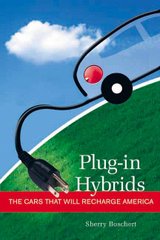The basic question addressed, which appears on the
study homepage (epri-reports.org) is this:
How would air quality and greenhouse gas emissions be affected if significant numbers of Americans drove cars that were fueled by the power grid?Simply put, the study found what advocates of electric transportation have long held to be true: as regards greenhouse gases and pollution generally speaking, the worst electricity is still better than petroleum. And the grid is getting cleaner and more renewable every year.
A few highlights below, but the significant question that remains is whether this study will make any difference in the public policy advocated by those who shape our understanding of what's possible and most beneficial. Environmental organization and utilities have long known the benefits of electric transportation, but have been cowed by the auto makers' unwillingness to make grid-connected product. You can dig around the websites of NRDC, UCS and the Sierra Club and come to understand that an electric path would be best for all of us, but their advocacy has not reflected the science. UCS advocates relentlessly for cleaner gasoline vehicles and dismisses plug-ins of all sorts, the Sierra Club strikes deals with Ford to promote a few thousand gasoline-dependent hybrids in exchange for advertising dollars, and the NRDC jumped on the biofuels bandwagon just as the cost of corn ethanol became impossible to ignore. I truly hope we have turned a corner.
The EPRI/NRDC study is an exceedingly detailed assessment using modeling analyses of various scenarios to determine the impact of plug-in hybrids. From the two summaries:
Greenhouse Gases
Researchers drew the following conclusions from the modeling exercises:
•Annual and cumulative GHG emissions are reduced significantly across each of the nine scenario combinations.
•Annual GHG emissions reductions were significant in every scenario combination of the study, reaching a maximum reduction of 612 million metric tons in 2050 (High PHEV fleet penetration, Low electric sector CO2 intensity case).
•Cumulative GHG emissions reductions from 2010 to 2050 can range from 3.4 to 10.3 billion metric tons.
•Each region of the country will yield reductions in GHG emissions.
....
The use of electricity is an important attribute of PHEVs. Use of electricity reduces both gasoline consumption and emissions—starting emissions, refueling emissions, running emissions and even upstream refinery emissions.
......
PHEVs have lower GHG emissions in all nine cases than either the conventional or the hybridvehicles, ranging from a 40% to 65% improvement over the conventional vehicle to a 7% to 46% improvement over the hybrid electric vehicle.
Air Quality
Because of the significant reduction in emissions from gasoline and diesel fuel use and because caps are in place for some conventional pollutants for the electric power sector, the study finds that in many regions deployment of PHEVs would reduce exposures to ozone and particulate matter, and reduce deposition rates for acids, nutrients, and mercury.
Overall, the air quality benefits from PHEVs are due to a reduction of vehicle emissions below levels required by current regulation (due to their non-emitting operation in all-electric mode), and because most electricity generation emissions are constrained by existing regulatory caps. Any additional increase in the amount of all-electric vehicle miles traveled or further emissions constraints on the electric sector would tend to magnify these benefits.


